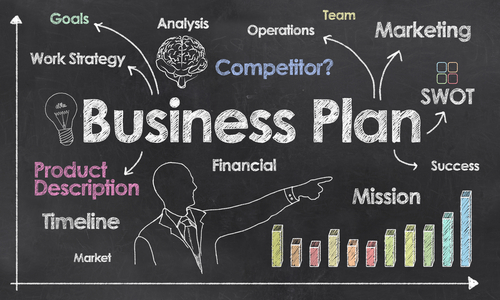1- Definition: what is a business plan?

The Business Plan is a reference document that details the project of a startup company or activity. It defines the financial, commercial, and structural development of a business or activity for the first few years.
It is a structuring tool that allows the identification of objectives and anticipation of potentialities as well as obstacles and their solutions.
It is also a presentation tool that can be used to solicit the various economic actors and partners (banks, public administrations, etc.).
The Business Plan will allow, amongst others, to answer questions such as:
– Who are we (legal structure, shareholders, location,)?
– What is our activity (product, service)?
– What are our products or services intended for (customers)?
– What is our marketing method (distribution network, sales plan)?
– Who are our competitors?
– What are the deadlines?
– How is the product manufactured ( manufacturing process, suppliers, technology, etc.)?
– What are the costs (amount, type of funding)?
– What are the expected gains?
The business plan is therefore an essential element in the Entrepreneur’s career path. It enables ideas to be gathered and organized in order to study the feasibility of a business creation project or an activity in its development.
2- Structure of a Business Plan

The structure of a business plan depends on its type of activity and the market concerned; however, its elaboration involves essentially, the drafting of the following parts:
– The project summary: as it summaries the whole Business Plan, this part is the last step to be written. It is one of the most important parts of a business plan and generally includes the problem to which the project is going to respond, the solution, the company’s business model, the team, and the relevance of each member, the short-term results, the need for financing, etc.
– The project team and stakeholders: this part includes the presentation of the project manager, associates, partners, and suppliers. It introduces their motivations, skills, experience, training etc.
– The market: This section determines the opportunities and risks of the sector. In this case, it is so important to have statistical data in order to identify the characteristics and the strategy of the future business. The market survey is an essential step; it allows understanding our clients in order to create a truly relevant offer.
– The offer: This part is based on the value proposition of the product or service offered to customers, it is about meeting the needs of the market. This concerns the study of the product or service, its characteristics, its price, its usefulness, etc.
– The commercial strategy: This part concerns the study of the different commercial policies that will be adopted by the company: price policy, product, distribution, communication, etc. It must be adapted according to the strengths and weaknesses of the project.
– The financial forecast: This is the quantified part of a business plan. It must convince the funding actors (bankers and/or investors, the State) of the feasibility and sustainability of the project. Forecasts are generally based on the first three, four, or five years.
– Legal status: This is the most complicated part of the business creation process, as it is necessary to find the most advantageous status for the creation. The legal status is specific to each business and each entrepreneurial profile. For that, it will be necessary to study: the most appropriate tax regime, the relevant social status for the manager, the future prospects, the relationship with the partners, etc.
Finally, a well-written business plan is the entrepreneur’s best ally. It will give him a global vision of his activity. It will help him to take the appropriate strategic decisions according to the market and its evolution.




